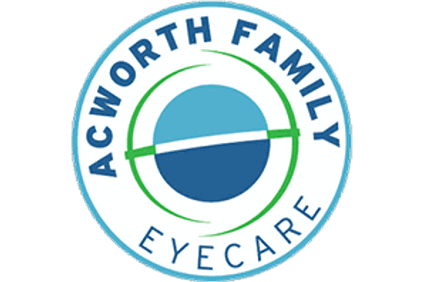People who are obese are at higher risk of developing some sight-threatening eye conditions and diseases. Read on to discover why, and how we can help.
It is well documented that obesity impacts health in numerous ways, from a higher incidence of diabetes to cardiovascular disease. What many people don’t know is obesity’s negative effect on vision and eye health. Speak with our Eye care professionals at Acworth Family Eyecare about any concerns you may have about your eye health or vision.
There is increasing evidence that obese individuals have a greater risk of developing serious, sight-threatening eye diseases.
Researchers at the Goldschleger Eye Institute at the Sheba Medical Center found a consistent link between obesity and the development of age-related macular degeneration, cataracts, glaucoma, and diabetic retinopathy.
The researchers noted that the public is largely unaware of this link, despite the evidence. If more people knew about the risk, they said, it might motivate them to try to shed some extra weight.
How Does Obesity Impact The Eyes?
A body mass index (BMI) of 25-30 is considered overweight and any BMI over 30 is considered obese. Recent studies indicate that a handful of ocular diseases can now be added to the list of medical conditions associated with an elevated BMI.
Diabetic retinopathy, floppy eyelid syndrome, retinal vein occlusions, stroke-related vision loss, and age-related macular degeneration are all risk factors of obesity.
While the cause is not yet certain, researchers believe this may be due to the peripheral artery disease prevalent among people who are obese. When the tiny blood vessels around the eyes are compromised, they may have trouble delivering oxygen and other nutrients to the eye area.
Obesity is also a risk factor for developing cataracts (the clouding of the eye’s natural lens). Poor nutrition or high blood sugar levels, which are commonly found in people with obesity, may contribute to the cloudiness.
Although obesity may contribute to cataract formation, losing weight may not significantly reduce the risk of developing them, partly because cataracts are also a common consequence of aging, whatever one’s weight.
Additionally, morbid obesity is associated with higher inner eye pressure, which may increase one’s risk of glaucoma and glaucomatous optic neuropathy — leading causes of vision loss and blindness. Morbid obesity is defined as having a BMI of 40 or above, or 35 and above with health conditions like high blood pressure or diabetes.
Stay Active, Healthy, and Have Regular Eye Exams
An active lifestyle and a nutritious diet can help you maintain a healthy weight and improve overall physical and eye health. Try to include several key nutrients into your diets, such as vitamins C and E, zeaxanthin, omega-3, zinc, and lutein, as they may help delay or prevent certain eye diseases.
While a balanced diet and regular exercise significantly increase your chance of living a healthy life, it’s also crucial to have regular eye exams. A comprehensive eye exam with Dr. Dylan Reach can help detect the onset of ocular disease and ensure the earliest and most effective treatment to preserve your gift of sight.
Don’t hesitate to call Acworth Family Eyecare in Acworth with any questions or concerns regarding your vision or eye health — we’re here for you.
Many eye diseases can be quickly and easily diagnosed during a Comprehensive eye exam, Pediatric eye exam and Contact lens eye exam. If you were diagnosed with an eye disease, such as Cataracts, Astigmatism, Pink Eye or conjunctivitis Myopia or Nearsightedness , Glaucoma, Macular degeneration, Diabetic retinopathy, or Dry eye, you may be overwhelmed by the diagnosis and confused about what happens next. Will you need medications or surgery – now or in the future? Is LASIK eye and vision surgery an option for you ? Our Acworth eye doctor is always ready to answer your questions about eye disease and Contact lenses.
Book an eye exam at Acworth Family Eyecare eye clinic near you in Acworth, Georgia to learn more about your candidacy for contact lenses and which type is right for you. Call 770-974-3153
Acworth Family Eyecare, your Acworth eye doctor for eye exams and eye care
Alternatively, book an appointment online here CLICK FOR AN APPOINTMENT
FOLLOW US
-
Is it possible to prevent Macular Degeneration?
Doctors aren't sure how to prevent macular degeneration. Research suggests that ultraviolet light (and possibly blue light) factors into the problem, so sunglasses could be very beneficial.
-
My doctor says I have a cataract, but he wants to wait a while before removing it. Why?
A cataract usually starts very small and practically unnoticeable but grows gradually larger and cloudier. Your doctor is probably waiting until the cataract interferes significantly with your vision and your lifestyle. You need to continue to visit your eye doctor regularly so the cataract's progress is monitored. Some cataracts never really reach the stage where they should be removed. If your cataract is interfering with your vision to the point where it is unsafe to drive, or doing everyday tasks is difficult, then it's time to discuss surgery with your doctor.
-
What exactly is glaucoma?
Glaucoma is a condition in which the eye's intraocular pressure (IOP) is too high. This means that your eye has too much aqueous humor in it, either because it produced too much, or because it's not draining properly. Other symptoms are optic nerve damage and vision loss. Glaucoma is a silent disease that robs the patient of their peripheral vision. Early detection is very important.
-
What is diabetic retinopathy?
Doctors aren't sure how to prevent macular degeneration. Research suggests that ultraviolet light (and possibly blue light) factors into the problem, so sunglasses could be very beneficial.

